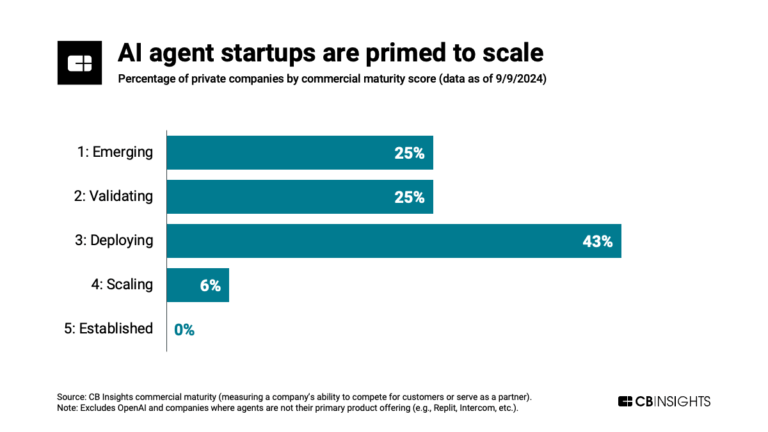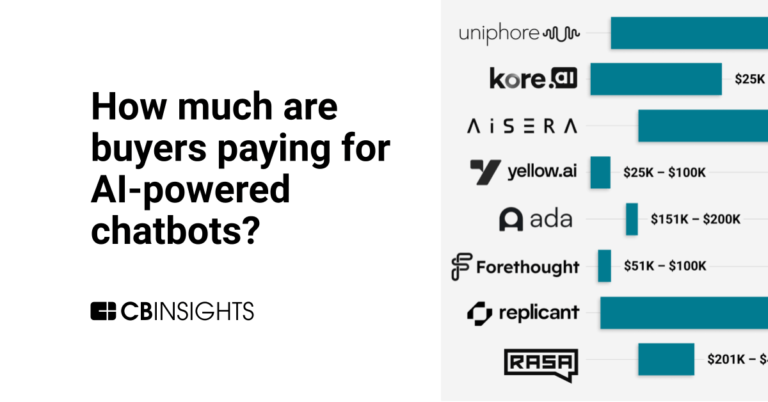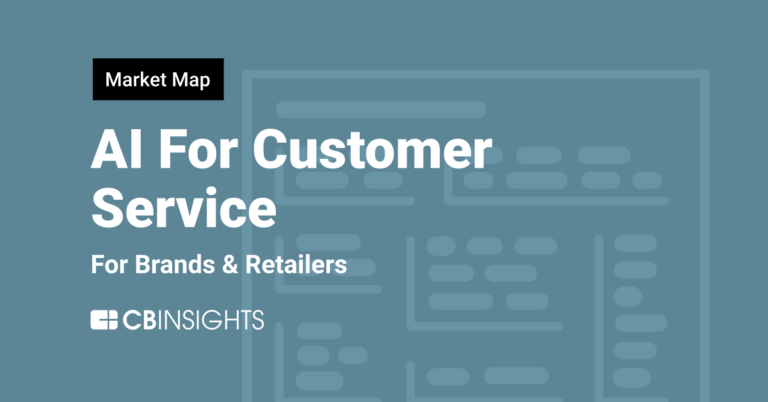
Ada
Founded Year
2016Stage
Series C | AliveTotal Raised
$190.73MValuation
$0000Last Raised
$130M | 4 yrs agoMosaic Score The Mosaic Score is an algorithm that measures the overall financial health and market potential of private companies.
-47 points in the past 30 days
About Ada
Ada specializes in artificial intelligence (AI) powered customer service automation within various business sectors. The company offers a platform that enables enterprises to resolve customer inquiries efficiently across multiple channels and languages without the need for extensive human intervention. Ada's solutions cater to industries such as e-commerce, financial technology, software as a service (SaaS), and gaming. It was founded in 2016 and is based in Toronto, Canada.
Loading...
Ada's Product Videos


ESPs containing Ada
The ESP matrix leverages data and analyst insight to identify and rank leading companies in a given technology landscape.
The retail AI agents market provides AI-powered conversational agents that enhance e-commerce and retail customer experiences through automated support and sales assistance. These agents use natural language processing and machine learning to handle customer inquiries, product recommendations, order management, and automated query resolution across chat, email, and voice channels. Solutions includ…
Ada named as Challenger among 15 other companies, including Sierra, DRUID, and GupShup.
Ada's Products & Differentiators
AI Agent
Ada is the leader in AI customer service, designed to be your #1 customer service employee. Businesses build AI agents on Ada, an AI customer service platform that makes managing AI agents as seamless as managing a human team member. With built-in capabilities to test, measure, coach, and continuously improve AI agent performance, Ada ensures customer interactions are always relevant, accurate, and secure. AI agents built on Ada are powered by the Ada Reasoning Engine™, continuously learning and evolving to deliver extraordinary customer service at scale.
Loading...
Research containing Ada
Get data-driven expert analysis from the CB Insights Intelligence Unit.
CB Insights Intelligence Analysts have mentioned Ada in 6 CB Insights research briefs, most recently on Oct 17, 2024.
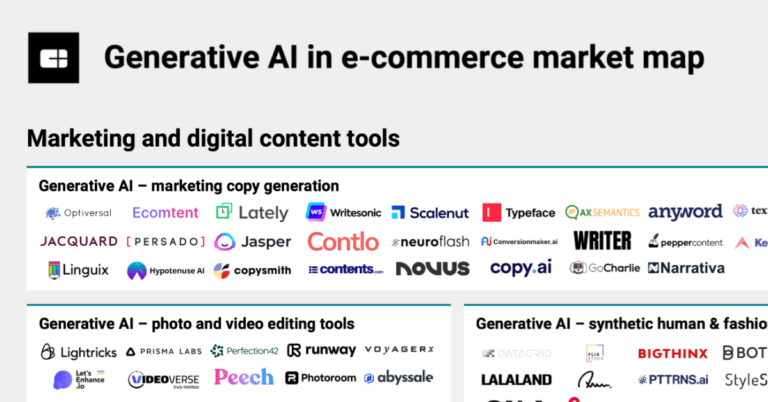
Oct 17, 2024
The generative AI for e-commerce market map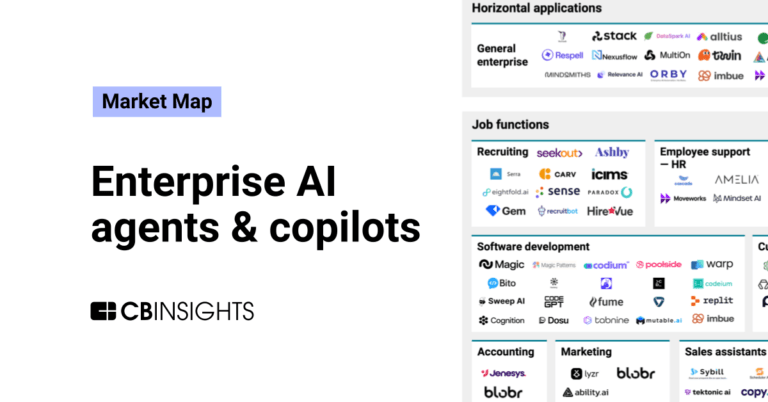
Aug 7, 2024
The enterprise AI agents & copilots market map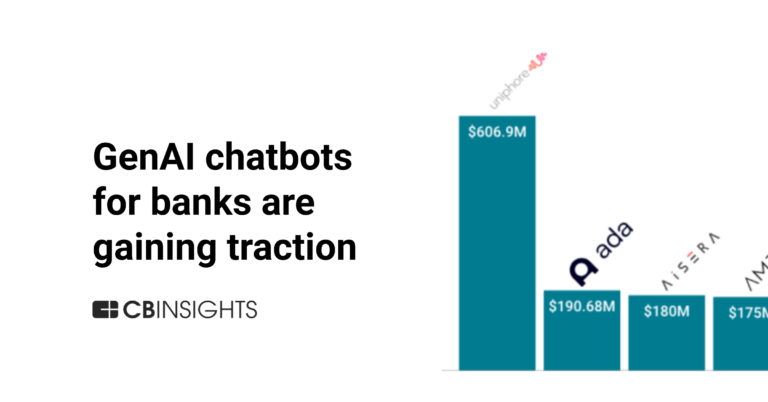
Expert Collections containing Ada
Expert Collections are analyst-curated lists that highlight the companies you need to know in the most important technology spaces.
Ada is included in 6 Expert Collections, including Unicorns- Billion Dollar Startups.
Unicorns- Billion Dollar Startups
1,287 items
Artificial Intelligence
13,028 items
Companies developing artificial intelligence solutions, including cross-industry applications, industry-specific products, and AI infrastructure solutions.
Sales & Customer Service Tech
1,112 items
Companies offering technology-driven solutions for brands and retailers to enable customer service before, during, and after in-store and online shopping.
Generative AI
2,841 items
Companies working on generative AI applications and infrastructure.
AI Agents & Copilots Market Map (August 2024)
322 items
Corresponds to the Enterprise AI Agents & Copilots Market Map: https://app.cbinsights.com/research/enterprise-ai-agents-copilots-market-map/
AI agents
376 items
Companies developing AI agent applications and agent-specific infrastructure. Includes pure-play emerging agent startups as well as companies building agent offerings with varying levels of autonomy. Not exhaustive.
Ada Patents
Ada has filed 8 patents.
The 3 most popular patent topics include:
- computational linguistics
- natural language processing
- artificial intelligence

Application Date | Grant Date | Title | Related Topics | Status |
|---|---|---|---|---|
9/7/2022 | 4/1/2025 | Natural language processing, Computational linguistics, Disability sport classifications, Machine learning, Artificial intelligence | Grant |
Application Date | 9/7/2022 |
|---|---|
Grant Date | 4/1/2025 |
Title | |
Related Topics | Natural language processing, Computational linguistics, Disability sport classifications, Machine learning, Artificial intelligence |
Status | Grant |
Latest Ada News
Sep 15, 2025
As AI tools become more capable of handling basic inquiries, human agents will need to shift their focus to complex or specialized work that AI still can’t manage. "I believe agents need to become SMEs in specific areas," Jorge Damico, founder of Auxyly , a fractional customer support provider, told CMSWire. "With deeper, specialized knowledge, they gain the advantage of solving complex problems AI still can’t handle." He explained that industries dependent on human interaction—such as field services—are less vulnerable to AI displacement, but digital-first sectors will need to upskill support teams quickly. As AI continues to improve, customer support roles will shift toward more strategic, judgment-based work. Agents may evolve into escalation specialists, journey analysts, or AI trainers—roles that didn’t exist a decade ago. The future of AI in customer service isn’t about removing people from the equation, but empowering them to do more of what makes them uniquely human. Choosing the Right AI Customer Service Tools How to Choose AI Customer Support Tools With so many platforms promising smarter, faster service, selecting the right AI-powered customer support tools can feel overwhelming. The key is to focus on how well a solution aligns with your team’s workflows, data ecosystem, and customer experience goals—not just the flashiest features. First, look for platforms that offer true AI-driven customer support, meaning they go beyond basic automation and provide capabilities like intent recognition , contextual understanding , and real-time learning. Equally important is integration: AI tools should easily connect with a business’s existing CRM, helpdesk and communication channels to avoid data silos and duplicated effort. Scalability and customization are also critical. Can the solution grow with the brand’s support volume and business complexity? Can it be tailored to its tone, branding and escalation policies? These factors often make the difference between a one-size-fits-all chatbot and a fully integrated customer support assistant. Measure What Matters: Accuracy, CSAT and Containment While flashy features get attention, urged businesses to focus on metrics that reflect real value—starting with response accuracy. "Higher response accuracy improves the customer experience," Balaceanu said. "It also dictates downstream value, whether it’s revenue generation or cost savings through contact containment." He also stressed the importance of tracking these KPIs over time to fine-tune the platform and maximize long-term performance. Finally, vendor reputation matters. Look for proven track records, transparent AI practices and strong support offerings. A good partner doesn’t just sell you software—they help you evolve your support strategy. What Are Some AI Customer Support Platforms to Consider? While dozens of tools offer AI-powered customer support capabilities, here's a look at a few platforms that feature enterprise readiness, flexibilit and innovation: Zendesk AI - A customer experience staple, Zendesk now offers AI-powered bots, intelligent triage, and agent assist tools natively within its platform. It’s easy to implement for existing Zendesk users but can be costly at scale and less customizable than some newer entrants. Intercom Fin AI - Intercom’s Fin uses GPT technology to answer questions based on help center content and automatically escalate to human agents when needed. It’s ideal for fast-growing SaaS businesses, though it relies on structured content for high accuracy. Salesforce Service GPT - Part of the Einstein 1 Platform, Service GPT offers generative AI for case summaries, response suggestions and proactive support insights. Best suited for large enterprises already on Salesforce, but implementation can be complex. Ada - Ada specializes in AI-powered customer support automation with strong NLP capabilities and customizable workflows. It’s known for fast deployment and high containment rates but may require hands-on tuning for optimal performance. Rep AI - As highlighted in the SNOW Cosmetics example, Rep AI turns customer support into a revenue driver through personalized shopping experiences, proactive engagement and sales attribution tracking. It’s particularly strong for ecommerce use cases. Each of these platforms reflects a different approach to AI-powered customer support—from embedded automation in traditional helpdesk systems to newer tools that blend service with sales. The right solution will depend on your business model, support complexity and integration needs. How to Improve Customer Support With AI For brands ready to embrace smarter service, the key to success lies in thoughtful implementation—not just adopting AI, but using it for customer service in a way that aligns with business goals and enhances the human experience . While many companies rush to adopt AI to stay competitive, few step back to assess their foundational readiness—and it often leads to poor outcomes. Damico told CMSWire, "Sometimes the real problem isn’t lack of AI, it’s the lack of solid processes, clean data, or a decent knowledge base. If your house isn’t in order, AI won’t fix it. It’ll just make the mess faster. Prioritize clarity over trend chasing." Damico stressed that AI works best when paired with strong operational hygiene and a clearly defined success framework. Before implementation, businesses should honestly evaluate whether they’re solving the right problem—and whether AI is the best tool for the job. Practical Steps: Diagnose Pain Points, Involve Agents, Track KPIs Start by identifying the pain points the brand is seeking to resolve. Do they need faster response times? Better self-service options? More efficient escalation handling? Setting clear goals helps businesses design AI workflows that deliver meaningful results, whether they’re launching a chatbot, an AI-driven knowledge base, or real-time agent assist tools. Next, involve your support agents from the start. They understand customer needs better than anyone and can help train, test, and improve AI models. When agents see AI as a partner—rather than a threat—they’re more likely to adopt it and use it effectively. Finally, track your progress. The best way to improve customer support with AI is to measure its real-world impact with metrics such as resolution speed, CSAT scores, agent productivity and cost savings. These metrics will help you refine your approach and build the case for continued investment. Conclusion: The Real Role of AI in Customer Service AI customer support isn’t about replacing the human touch—it’s about strengthening it. By automating routine inquiries and delivering real-time insights, AI frees agents to focus on complex issues, empathy and relationship-building. The businesses that win will be those that blend speed and scale with human judgment, creating experiences that drive loyalty and growth. The future of customer service is clear: success depends on strategically using AI customer support to combine efficiency, personalization and trust. FAQ on AI Customer Support Here are some questions around AI customer support: About the Author Scott Clark is a seasoned journalist based in Columbus, Ohio, who has made a name for himself covering the ever-evolving landscape of customer experience, marketing and technology. He has over 20 years of experience covering Information Technology and 27 years as a web developer. His coverage ranges across customer experience, AI, social media marketing, voice of customer, diversity & inclusion and more. Scott is a strong advocate for customer experience and corporate responsibility, bringing together statistics, facts, and insights from leading thought leaders to provide informative and thought-provoking articles. Connect with Scott Clark: Tags
Ada Frequently Asked Questions (FAQ)
When was Ada founded?
Ada was founded in 2016.
Where is Ada's headquarters?
Ada's headquarters is located at 46 Spadina Avenue, Toronto.
What is Ada's latest funding round?
Ada's latest funding round is Series C.
How much did Ada raise?
Ada raised a total of $190.73M.
Who are the investors of Ada?
Investors of Ada include Version One Ventures, Bessemer Venture Partners, FirstMark Capital, Burst Capital, Accel and 10 more.
Who are Ada's competitors?
Competitors of Ada include Sierra, Cognigy, Maven AGI, Forethought, DeepConverse and 7 more.
What products does Ada offer?
Ada's products include AI Agent and 2 more.
Who are Ada's customers?
Customers of Ada include Trust & Will , Life360, Monday.com and Checkr .
Loading...
Compare Ada to Competitors

Intercom provides a customer service platform that utilizes artificial intelligence to assist with customer support. It has developed a support agent named Fin, which responds to customer inquiries, along with tools such as an inbox, ticketing system, and reporting features. Its platform is applicable in sectors like financial services, software and technology, and healthcare. It was founded in 2011 and is based in San Francisco, California.

Inbenta specializes in conversational AI and automation within the customer service sector. The company offers a suite of products, including AI-enabled chatbots, search tools, and knowledge management systems designed to enhance customer experience and streamline service operations. Inbenta's conversational AI platform is utilized across various industries to automate customer interactions, provide self-service options, and improve overall customer satisfaction. It was founded in 2005 and is based in Allen, Texas.

Sierra provides artificial intelligence (AI) agents for customer support across various business sectors. The agents engage in personalized interactions and can be integrated with existing call center technologies. The platform is designed to meet security and compliance requirements and can be tailored to the needs of clients. It was founded in 2023 and is based in San Francisco, California.

Pypestream develops customer engagement solutions within the technology sector. The company offers a platform that automates customer service, sales, and operational processes through the use of AI microagents, allowing businesses to interact through various channels. Pypestream serves enterprises across industries including insurance, healthcare, travel, telecommunications, streaming, financial services, and eCommerce. It was founded in 2015 and is based in New York, New York.

Kustomer provides customer service solutions within the Customer Relationship Management (CRM) platform industry. Its offerings include a platform for managing customer interactions across channels and support tools that utilize automation and artificial intelligence (AI). It serves sectors that require customer relationship management and service automation, using data and AI. It was founded in 2015 and is based in Short Hills, New Jersey.
Indemn is involved in machine learning powered chatbots within the insurance sector. The company has a platform for online insurance services, allowing customers to inquire about insurance and purchase coverage. They focus on Event and Wedding Insurance for hosts seeking to mitigate potential issues related to their events. It was founded in 2021 and is based in New York, New York.
Loading...

